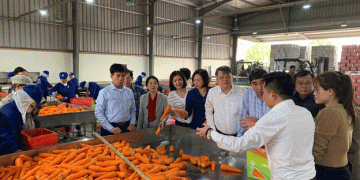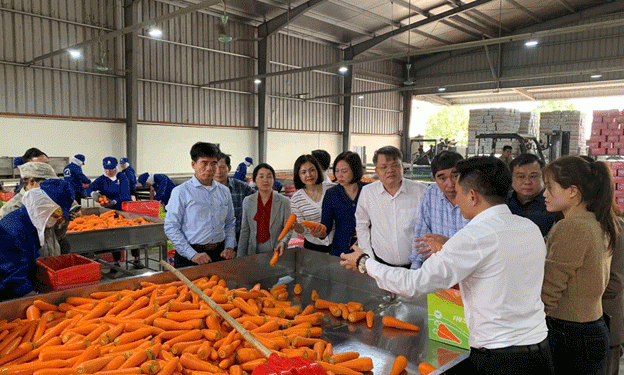Vietnam’s carrot industry, led by prominent farmers like Nguyen Duc Men, is at a turning point. With over 10,000 tons of carrots harvested annually, 30% of which are exported to countries such as Japan, Korea, and China, the need for proper storage solutions has never been more urgent. Men, recognized as one of Vietnam’s most outstanding farmers in 2024, emphasized the necessity for cold storage and deep processing facilities to maintain the freshness and quality of produce during the harvest season.
Men’s company, Tan Phong Agricultural Food Processing Corporation, operates across 100 hectares of carrot production, purchasing an average of 150 tons of carrots daily during peak season. However, without proper cold storage, the company and the farmers it works with risk losing large amounts of valuable produce. Currently, only 70% of their production is consumed domestically, while the remaining 30% is exported. The ability to store carrots for up to 6-8 months in cold storage would allow Vietnamese farmers to maintain a steady supply of high-quality produce and avoid the common price drops that occur during the glut of harvest season.
Production and Export Impact
Men’s operations also include the production of more than 3,000 tons of onions and garlic, over 1,000 tons of radishes, and over 3,000 tons of winter vegetables, such as cabbage and kohlrabi. With such a vast output, the lack of sufficient cold storage and processing facilities hinders the long-term sustainability of these agricultural exports. Men points out that during high-production seasons, the industry faces challenges in maintaining the freshness of produce, especially without advanced storage technologies.
Cold storage is essential not only for carrots but also for the other crops that Men’s company deals with. For instance, onions and garlic could also benefit from extended storage to smooth out supply fluctuations. The company currently owns 600 cold storage units with a capacity to store around 7 tons of produce and one freezing warehouse. However, this is not enough to meet the demands of the growing agricultural sector in Vietnam. Expanding cold storage capacity would enable better collaboration between farmers and businesses, ensuring more stable pricing and preventing the degradation of produce quality.
Call for Investment and Infrastructure Development
Men has appealed to both the Vietnam Farmers’ Association and the Ministry of Agriculture and Rural Development for more support. At the 2024 National Farmers Forum, he emphasized the need for government-backed investments in agricultural cold storage systems, which would extend the shelf life of carrots and other vegetables. By doing so, farmers would avoid the inevitable price drops during periods of oversupply and maintain a competitive edge in international markets.
Vietnam’s agriculture sector is largely driven by seasonal harvests, making cold storage a crucial element for managing large volumes of produce during peak periods. Without it, farmers face the risk of losing crop value and market opportunities. Investments in cold storage would allow farmers to store and preserve their produce during the off-season, which would help stabilize prices and increase exports.
For Vietnam’s agriculture industry to thrive and remain competitive in global markets, cold storage investment is critical. Nguyen Duc Men’s appeal for infrastructure improvements, particularly in cold storage and processing facilities, highlights the ongoing challenges faced by farmers and agricultural companies in managing high-volume production. With proper storage, the value of Vietnam’s crops, including carrots and other vegetables, can be preserved, enhancing their brand value in both domestic and international markets. The future of sustainable agriculture in Vietnam depends on these essential investments.































